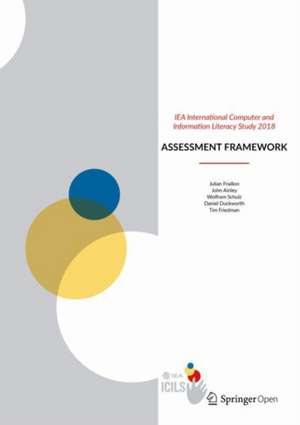IEA International Computer and Information Literacy Study 2018 Assessment Framework
Autor Julian Fraillon, John Ainley, Wolfram Schulz, Daniel Duckworth, Tim Friedmanen Limba Engleză Paperback – 16 aug 2019
The ICILS assessment framework articulates the basic structure of the study, providing a description of the field and the constructs to be measured. This book outlines the design and content of the measurement instruments, sets down the rationale for those designs, and describes how measures generated by those instruments relate to the constructs. Hypothesized relations betweenconstructs provide the foundation for some of the analyses that follow. Above all, the framework links ICILS to other similar research, enabling the contents of this assessment framework to combine theory and practice in an explication of both the ‘what’ and the ‘how’ of ICILS.
Preț: 413.27 lei
Nou
Puncte Express: 620
Preț estimativ în valută:
79.08€ • 82.40$ • 65.48£
79.08€ • 82.40$ • 65.48£
Carte disponibilă
Livrare economică 13-27 martie
Preluare comenzi: 021 569.72.76
Specificații
ISBN-13: 9783030193881
ISBN-10: 3030193888
Pagini: 76
Ilustrații: VII, 74 p.
Dimensiuni: 210 x 297 mm
Greutate: 0.23 kg
Ediția:1st ed. 2019
Editura: Springer International Publishing
Colecția Springer
Locul publicării:Cham, Switzerland
ISBN-10: 3030193888
Pagini: 76
Ilustrații: VII, 74 p.
Dimensiuni: 210 x 297 mm
Greutate: 0.23 kg
Ediția:1st ed. 2019
Editura: Springer International Publishing
Colecția Springer
Locul publicării:Cham, Switzerland
Cuprins
Foreword.- 1. Introduction.- 2. Computer and information literacy framework.- 3. Computational thinking framework.- 4. Contextual framework.- 5. ICILS instruments.- 6. References.- Appendix.
Textul de pe ultima copertă
This open-access book presents the assessment framework for IEA’s International Computer an Information Literacy Study (ICILS) 2018, which is designed to assess how well students are prepared for study, work and life in a digital world. The study measures international differences in students’ computer and information literacy (CIL): their ability to use computers to investigate, create, participate and communicate at home, at school, in the workplace and in the community. Participating countries also have an option for their students to complete an assessment of computational thinking (CT).
The ICILS assessment framework articulates the basic structure of the study, providing a description of the field and the constructs to be measured. This book outlines the design and content of the measurement instruments, sets down the rationale for those designs, and describes how measures generated by those instruments relate to the constructs. Hypothesized relations between constructs provide the foundation for some of the analyses that follow. Above all, the framework links ICILS to other similar research, enabling the contents of this assessment framework to combine theory and practice in an explication of both the ‘what’ and the ‘how’ of ICILS.
The ICILS assessment framework articulates the basic structure of the study, providing a description of the field and the constructs to be measured. This book outlines the design and content of the measurement instruments, sets down the rationale for those designs, and describes how measures generated by those instruments relate to the constructs. Hypothesized relations between constructs provide the foundation for some of the analyses that follow. Above all, the framework links ICILS to other similar research, enabling the contents of this assessment framework to combine theory and practice in an explication of both the ‘what’ and the ‘how’ of ICILS.
Caracteristici
Establishes the assessment framework for an international assessment of how well students are prepared for study, work, and life in the digital age Provides internationally comparable indicators of students’ computer and information literacy Supports countries in assessing the comparative international standing of their students’ computer literacy
